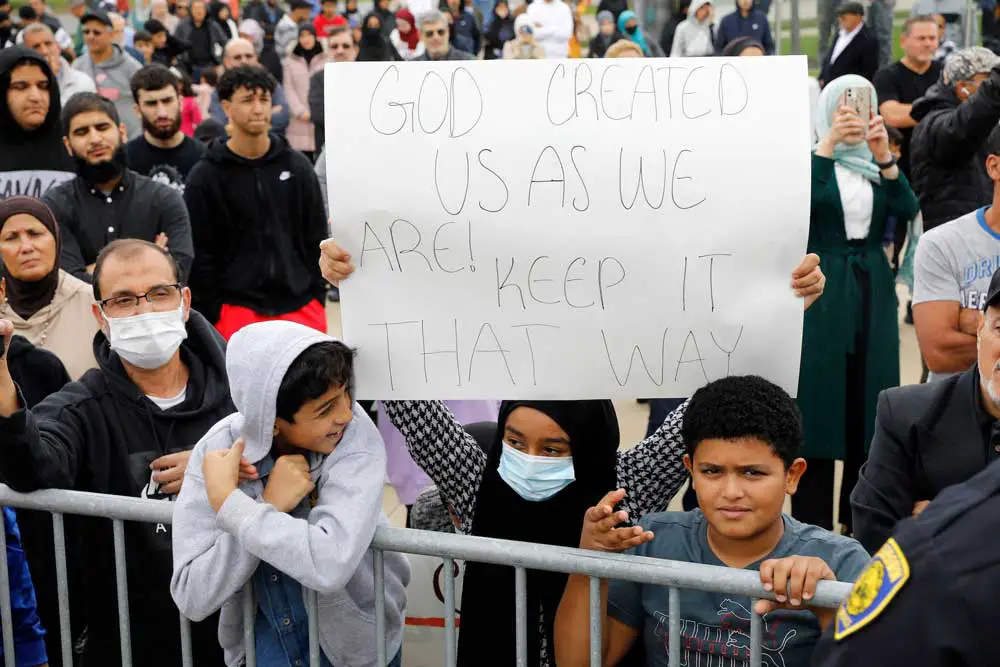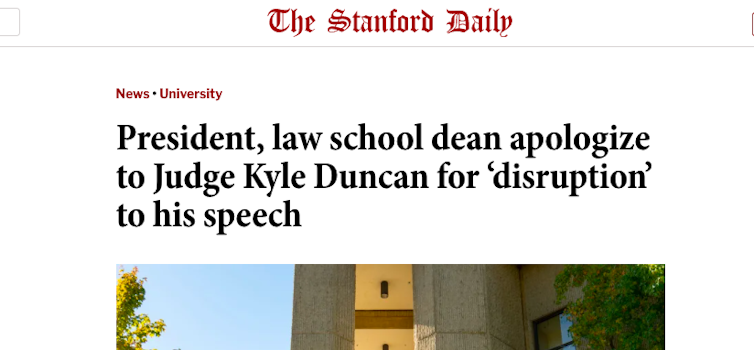
By Erica Goldberg
Students’ shutting down campus public speakers has become increasingly common at universities across the U.S.
Recently at Stanford Law School, student protesters shouted over a Trump-appointed federal judge and disrupted the speech he had been invited by students to give.
Instead of telling the students that they were in violation of Stanford’s speech policy, the associate dean of diversity, equity, and inclusion, who attended the event, appeared to sympathize with the students. Taking the podium, she criticized the judge, in part because he was being hostile toward the student protesters.
The law school’s dean then issued a public apology to the judge and explained to the public that Stanford’s speech policies do not permit coordinated efforts to shut down invited speakers.
Students then protested the dean’s apology, claiming that “counter speech is free speech.” But coordinated efforts to shut down someone’s speech through disruption or threat of violence, sometimes called “the heckler’s veto,” is not protected free speech.
As a constitutional law professor who studies and writes about the First Amendment and free speech, I have seen a growing number of cases across the political spectrum in which people try to suppress others’ speech because it is deemed too harmful. This is happening not only among students and faculty on college campuses, but among those in state and local government, on school boards and library committees.
As a scholar in this area, I know that underlying the First Amendment is a belief that free and open discussion is what makes democracy strong. Conversely, repression of speech is not consistent with democratic ideals or practice.
The theory behind the First Amendment and the exercise of free speech is that speech, unlike physical conduct or force, should be countered with other speech. Speech is not itself violence, and challenging ideas promotes critical thinking and growth.
Much of the rising intolerance to speech has a common thread: Instead of using speech or protest to counter the speech or expression that critics dislike, people on the right and the left appear to want to prevent ideas they don’t like from entering the conversation.

Stanford Daily
Banning, repressing and shutting down
Over the past few years, legislators and government officials as well as some parents and school administrators, largely in Republican-leaning states, have demanded that certain books be removed from school libraries. Some government officials are trying to make it easier to remove books from public libraries, too.
Usually, the claim is that the books are inappropriate for children. Many of the books removed from libraries or school curricula include authors or characters who belong to racial, ethnic or religious minorities or are members of the LGBTQ+ community.
The right, in control of certain state governments, has increasingly attempted to use legislative power to ban certain speech.
Legislators have proposed bills to prohibit teachers from promoting specific views that they believe is harmful to children, or too sexual, or erodes students’ self-esteem, including suggestions that members of certain races are inherently privileged or disadvantaged because of their race.
Legislators have also proposed bills that ban drag shows where children may be in attendance. A Tennessee ban has been temporarily halted from going into effect by a federal judge. The ban likely violates the First Amendment because it does not apply only to sexually explicit speech.
Not just conservatives
The intolerance of certain speech is not limited to the political right.
Although many of the policies limiting what students read, see or hear come from conservatives, in some places high school administrators also censor or punish conservative speech, such as forcing students to take off sweatshirts that bear a slogan critical of President Joe Biden.
The left, especially in higher education, has promoted policies that would force faculty and staff to adhere to certain ideas, including the university’s stated mission, undercutting academic freedom and free speech values. An instructor at Hamline University in Minnesota had her job offer for the next semester rescinded after showing a class a historical depiction of the Prophet Muhammad that offended certain students. An applicant for a school superintendent position recently similarly had his job offer rescinded for addressing two women as “ladies.” This has a chilling effect on dissenting or even moderate voices in education.
Besides the specific examples of speech repression, a documented shift in public attitudes about free speech is happening that is more diffuse, but highly consequential for democracy.
Younger progressives seem eager to use the heckler’s veto to intimidate or block people from speaking.
For example, a former collegiate swimmer, recently invited to San Francisco State University to discuss her opposition to trans athletes’ competing in sports, faced protesters who were so aggressive that she had to be barricaded in a room for her own safety.
Undermining the search for truth
The censoriousness on the right and on the left can reinforce each other.
Universities are dominated in an unprecedented way by progressive professors and administrators. At many universities, including my own, professors have to demonstrate – sometimes even in their scholarship – a commitment to diversity, equity and inclusion.
This mandate, many argue, tramples on academic freedom and forces professors to tailor their scholarship to a particular politicized view of group rights versus individual rights.
Many state governments have responded to these progressive initiatives by enacting legislation that is even more censorious and potentially unconstitutional.
Ohio is considering a bill that prevents teaching particular subjects related to diversity at its universities. Part of the bill seeks to ensure that professors do not impose their views on students. That reflects a concern of the right, that professors force students to parrot back the professors’ own views, or that professors present material in a one-sided way.
In my view, these efforts to restrict what people can see, say or read undermine healthy discussions and the search for truth.
Room for agreement
Yet historically, free speech has been one area that both the right and the left have found a unifying, nonpartisan principle. First Amendment cases at the Supreme Court often get decided in ways that cut across partisan lines, even by courts that are quite politically divided.
The left, on principle, has been a major champion of offensive and hateful speech, including when the American Civil Liberties Union defended in 1977 the right of neo-Nazis to march in a town whose residents included many Holocaust survivors.
We live in a different world now, however, where white supremacist groups are armed and both the right and the left are polarized.
Censorship breeds more censorship. Attempts by both the left and the right to impose orthodoxy by stifling views leads ultimately to intolerance and authoritarianism. As Justice Robert H. Jackson said in a 1943 case that held that students in public schools cannot be forced to salute the flag, “If there is any fixed star in our constitutional constellation, it is that no official, high or petty, can prescribe what shall be orthodox in politics, nationalism, religion, or other matters of opinion.”
As much as people may dislike hearing views they consider harmful, that displeasure is evidence of what I believe is the most fundamental freedom guaranteed by federal law – freedom of expression.
![]()
Erica Goldberg is Professor of Law at the University of Dayton.





























Cid says
You have got to be kidding me! Left wingers are the ones who try to ban words they dislike or disrupt a speaking engagement by someone who’s views they disagree with. Typical Democrat hypocrisy here.